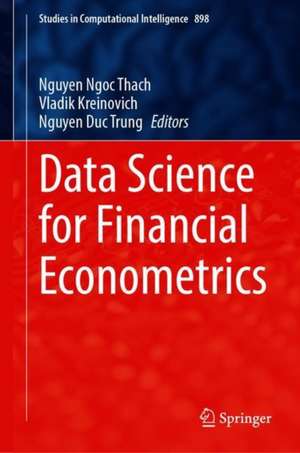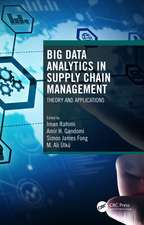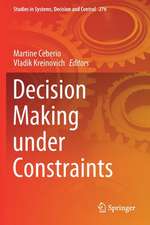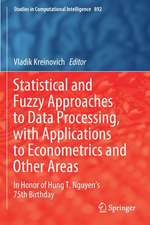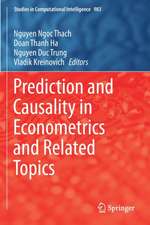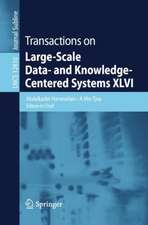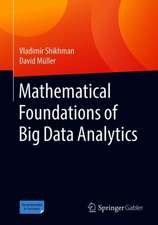Data Science for Financial Econometrics: Studies in Computational Intelligence, cartea 898
Editat de Nguyen Ngoc Thach, Vladik Kreinovich, Nguyen Duc Trungen Limba Engleză Hardback – 14 noi 2020
| Toate formatele și edițiile | Preț | Express |
|---|---|---|
| Paperback (1) | 1190.12 lei 38-44 zile | |
| Springer International Publishing – 14 noi 2021 | 1190.12 lei 38-44 zile | |
| Hardback (1) | 1295.34 lei 43-57 zile | |
| Springer International Publishing – 14 noi 2020 | 1295.34 lei 43-57 zile |
Din seria Studies in Computational Intelligence
- 20%
 Preț: 449.37 lei
Preț: 449.37 lei - 20%
 Preț: 1158.26 lei
Preț: 1158.26 lei - 20%
 Preț: 986.66 lei
Preț: 986.66 lei - 20%
 Preț: 1452.76 lei
Preț: 1452.76 lei - 20%
 Preț: 168.78 lei
Preț: 168.78 lei - 18%
 Preț: 1112.30 lei
Preț: 1112.30 lei - 20%
 Preț: 565.38 lei
Preț: 565.38 lei - 20%
 Preț: 649.28 lei
Preț: 649.28 lei - 20%
 Preț: 1047.73 lei
Preț: 1047.73 lei - 20%
 Preț: 1578.96 lei
Preț: 1578.96 lei - 20%
 Preț: 643.50 lei
Preț: 643.50 lei - 20%
 Preț: 657.49 lei
Preț: 657.49 lei - 20%
 Preț: 993.28 lei
Preț: 993.28 lei - 20%
 Preț: 990.80 lei
Preț: 990.80 lei - 20%
 Preț: 989.96 lei
Preț: 989.96 lei - 20%
 Preț: 1165.69 lei
Preț: 1165.69 lei - 20%
 Preț: 1444.52 lei
Preț: 1444.52 lei - 20%
 Preț: 1041.96 lei
Preț: 1041.96 lei - 20%
 Preț: 1047.73 lei
Preț: 1047.73 lei - 20%
 Preț: 1046.06 lei
Preț: 1046.06 lei - 18%
 Preț: 2500.50 lei
Preț: 2500.50 lei - 20%
 Preț: 989.13 lei
Preț: 989.13 lei - 20%
 Preț: 1165.69 lei
Preț: 1165.69 lei - 20%
 Preț: 1164.05 lei
Preț: 1164.05 lei - 20%
 Preț: 1042.79 lei
Preț: 1042.79 lei - 20%
 Preț: 1460.19 lei
Preț: 1460.19 lei - 18%
 Preț: 1403.52 lei
Preț: 1403.52 lei - 18%
 Preț: 1124.92 lei
Preț: 1124.92 lei - 20%
 Preț: 1039.47 lei
Preț: 1039.47 lei - 20%
 Preț: 1008.11 lei
Preț: 1008.11 lei - 20%
 Preț: 1045.25 lei
Preț: 1045.25 lei - 20%
 Preț: 1275.42 lei
Preț: 1275.42 lei - 20%
 Preț: 1040.32 lei
Preț: 1040.32 lei - 20%
 Preț: 988.32 lei
Preț: 988.32 lei - 20%
 Preț: 1169.79 lei
Preț: 1169.79 lei - 20%
 Preț: 1162.37 lei
Preț: 1162.37 lei - 20%
 Preț: 1059.26 lei
Preț: 1059.26 lei - 20%
 Preț: 1164.05 lei
Preț: 1164.05 lei - 20%
 Preț: 1166.52 lei
Preț: 1166.52 lei - 20%
 Preț: 1459.38 lei
Preț: 1459.38 lei - 18%
 Preț: 1005.74 lei
Preț: 1005.74 lei - 20%
 Preț: 997.38 lei
Preț: 997.38 lei - 20%
 Preț: 1055.94 lei
Preț: 1055.94 lei - 20%
 Preț: 1284.47 lei
Preț: 1284.47 lei - 20%
 Preț: 994.08 lei
Preț: 994.08 lei - 20%
 Preț: 1048.72 lei
Preț: 1048.72 lei - 20%
 Preț: 1066.02 lei
Preț: 1066.02 lei - 20%
 Preț: 943.78 lei
Preț: 943.78 lei - 20%
 Preț: 1173.10 lei
Preț: 1173.10 lei - 20%
 Preț: 1457.72 lei
Preț: 1457.72 lei
Preț: 1295.34 lei
Preț vechi: 1619.17 lei
-20% Nou
Puncte Express: 1943
Preț estimativ în valută:
247.87€ • 259.44$ • 206.30£
247.87€ • 259.44$ • 206.30£
Carte tipărită la comandă
Livrare economică 31 martie-14 aprilie
Preluare comenzi: 021 569.72.76
Specificații
ISBN-13: 9783030488529
ISBN-10: 3030488527
Ilustrații: X, 633 p. 91 illus., 71 illus. in color.
Dimensiuni: 155 x 235 mm
Greutate: 1.07 kg
Ediția:1st ed. 2021
Editura: Springer International Publishing
Colecția Springer
Seria Studies in Computational Intelligence
Locul publicării:Cham, Switzerland
ISBN-10: 3030488527
Ilustrații: X, 633 p. 91 illus., 71 illus. in color.
Dimensiuni: 155 x 235 mm
Greutate: 1.07 kg
Ediția:1st ed. 2021
Editura: Springer International Publishing
Colecția Springer
Seria Studies in Computational Intelligence
Locul publicării:Cham, Switzerland
Cuprins
A Theory-based Lasso for Time-Series Data.- Invariance-Based Explanation.- Composition of Quantum Operations and Their Fixed Points.- Information quality: the contribution of fuzzy methods.- Parameter-Centric Analysis Grossly Exaggerates Certainty.- Three Approaches to the Comparison of Random Variables.- A QP framework: a contextual representation of agents' preferences in investment choice.- How to Make a Decision Based on the Minimum Bayes Factor (MBF): Explanation of the Jeffreys Scale.- Extending the A Priori Procedure (APP) to Address Correlation Coefficients.- Variable Selection and Estimation in Kink Regression Model.- Performance of microfinance institutions in Vietnam.- Factors Influencing on University Reputation in Viet Nam: Model Selection by AIC.- Impacts of Internal and External Macro Factors on Firm Stock Price in an Expansion Econometric Model – A Case in Vietnam Real Estate Industry.- How Values Influence Economic Progress? An Evidence from South And Southeast Asian Countries.- The Effect of Governance Characteristics on Firm Performance: Evidence from Vietnam.- Does Capital Affect Bank Risk in Vietnam: A Bayesian Approach.
Textul de pe ultima copertă
This book offers an overview of state-of-the-art econometric techniques, with a special emphasis on financial econometrics. There is a major need for such techniques, since the traditional way of designing mathematical models – based on researchers’ insights – can no longer keep pace with the ever-increasing data flow. To catch up, many application areas have begun relying on data science, i.e., on techniques for extracting models from data, such as data mining, machine learning, and innovative statistics. In terms of capitalizing on data science, many application areas are way ahead of economics. To close this gap, the book provides examples of how data science techniques can be used in economics. Corresponding techniques range from almost traditional statistics to promising novel ideas such as quantum econometrics. Given its scope, the book will appeal to students and researchers interested in state-of-the-art developments, and to practitioners interested in using data science techniques.
Caracteristici
Presents recent findings and ideas on applying data science techniques to economic phenomena – and, in particular, financial phenomena Inspires practitioners to learn how to apply various data science techniques to economic problems and encourages researchers to further improve the existing techniques and to come up with new data science-based techniques for economics Written by respected experts in the field
